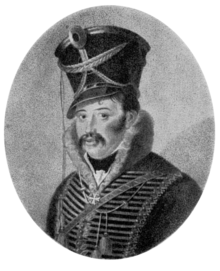Ferdinand von Schill
| Ferdinand Baptista von Schill | |
|---|---|

Ferdinand von Schill
|
|
| Born |
6 January 1776 Wilmsdorf / Bannewitz, Saxony |
| Died | 31 May 1809 (aged 33) Stralsund, Swedish Pomerania |
| Allegiance |
|
| Service/branch | Hussars |
| Years of service | 1788/90-1809 |
| Rank | Major |
| Commands held | Freikorps Schill |
| Battles/wars | Napoleonic Wars: Kolberg (1807); Stralsund (1809) |
Ferdinand Baptista von Schill (6 January 1776 – 31 May 1809) was a Prussian officer who revolted unsuccessfully against French domination in May 1809.
Schill was born at Wilmsdorf (now a part of Bannewitz, Saxony) and entered the Prussian Army's cavalry at the age of twelve or fourteen (sources differ). His father, Johann-Georg Schill, had been an ambitious commoner from Bohemia, who attained the aristocratic "von" for his services to Austria and Saxony during the Seven Years' War. J.G. von Schill had raised a "Freikorps", a small raiding party of cavalry and mounted infantry, operating behind enemy lines, and acquired some measure of fame and success. Many of Ferdinand von Schill's later biographers assumed that his father's example was an important influence on his subsequent career.
Ferdinand von Schill was a second-lieutenant of dragoons when he was wounded at the battle of Auerstadt. From that field he escaped to Kolberg, where he played a very prominent part in the celebrated siege of 1806–07, as the commander of a Freikorps, raiding behind the French lines. After the Treaty of Tilsit, he was promoted to major, awarded the Pour le Mérite, and given the command of a hussar regiment formed primarily from his Kolberg men.
In 1809 the political situation in Europe appeared to Schill to favor an attempt to liberate Germany from the French domination of Napoleon Bonaparte. He was an active member of the Tugendbund, the quasi-Masonic "League of Virtue" founded in June 1808, and including many notable Prussian reformers such as Gerhard von Scharnhorst and August Neidhardt von Gneisenau. It was banned in 1809. Many Tugendbund leaders believed that the new Kingdom of Westphalia, created by Napoleon from many smaller German states, and ruled by Napoleon's youngest brother Jérôme Bonaparte, was ripe for revolution. Schill planned to create an uprising in Westphalia that would topple the Bonaparte regime there, and – coupled with the efforts of Austria, Spain, and Britain – would bring about the fall of Napoleonic dominance in Germany.
...
Wikipedia
